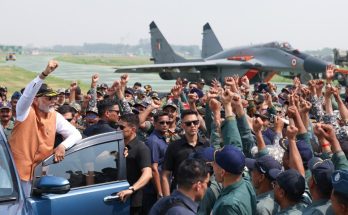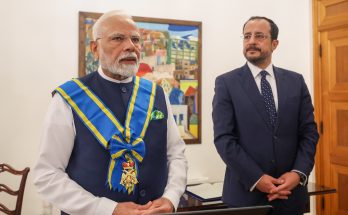
Amid rising nationalist sentiments in the country over the killing of 20 Indian soldiers during a face-off between Indian and Chinese soldiers in Ladakh, India sent out a tough message to China and accused it of taking “pre-meditated and planned action that was directly responsible for the resulting violence and casualties.”
In the telephonic conversation between India’s External Affairs Minister S. Jaishankar and his Chinese counterpart Wang Yi on June 17, Mr Jaishankar conveyed the protest of the Government of India in the strongest terms on the violent face-off in Galwan Valley on June 15, 2020, according to India’s Ministry of External Affairs.
Alluding to the June 6 agreement between senior Military Commanders on de-escalation and disengagement along the Line of Actual Control (LAC), the external affairs ministry said that while there was some progress, the Chinese side sought to erect a structure in Galwan valley on our side of the LAC. “While this became a source of dispute, the Chinese side took pre-meditated and planned action that was directly responsible for the resulting violence and casualties. It reflected an intent to change the facts on ground in violation of all our agreements to not change the status quo,” said the ministry in an account of the conversation between the foreign ministers of India and China.
Corrective Steps
Mr Jaishankar conveyed to Wang Yi that this unprecedented development “will have a serious impact on the bilateral relationship.” He stressed that the need of the hour was for the Chinese side to reassess its actions and take corrective steps. “The two sides should scrupulously and sincerely implement the understanding that was reached by the Senior Commanders on 6th June. Troops of both sides should also abide by the bilateral agreements and protocols,” Jaishankar told Wang Yi. The two sides should strictly respect and observe the line of actual control and should not take any unilateral action to alter it, said the ministry of external affairs.
Beijing, too, sent out a stern message to New Delhi. In the telephonic conversation, Mr Wang Yi, according to the Global Times, conveyed that “India must make sure similar incidents as that on Monday do not happen again. India must also not miscalculate the current situation, and not underestimate China’s determination to safeguard its sovereignty and territory.”
The conversation ended on a seemingly conciliatory note with both sides indicating their desire and intent to not escalate the issue further. Summing up the discussion, the Ministry of External Affairs: “At the conclusion of the discussion, it was agreed that the overall situation would be handled in a responsible manner, and both sides would implement the disengagement understanding of 6 June sincerely. Neither side would take any action to escalate matters and instead, ensure peace and tranquillity as per bilateral agreements and protocols.”
“The conversation between the foreign ministers of India and China clearly conveys that despite differing interpretations of the sequence of events leading to the killings on the border, the two sides have opted for strategic restraint,” said Manish Chand, Editor-in-Chief, India and the World magazine and India Writes Network. “The operative word in the ministry’s account of the conversation is a shared decision to handle the issue in a responsible manner and not to escalate matters. This is the only sensible way for the two neighbours to maintain peace and stability,” said Mr Chand.
In a measured response, Prime Minister Narendra Modi said that India wants peace but is capable of giving a befitting reply if provoked. In his first remarks on the border clash between soldiers of the Indian and Chinese army in eastern Ladakh on June 15, Mr Modi underlined that the sacrifices of soldiers along the border “will not go in vain”.
Mr Modi will be looking to firm up political consensus at an all-party meeting he has called on June 19 to discuss the fraught situation along the India-China border. Leaders of various political parties are expected to take part in the virtual meeting.
Author Profile
- India Writes Network (www.indiawrites.org) is an emerging think tank and a media-publishing company focused on international affairs & the India Story. Centre for Global India Insights is the research arm of India Writes Network. To subscribe to India and the World, write to editor@indiawrites.org. A venture of TGII Media Private Limited, a leading media, publishing and consultancy company, IWN has carved a niche for balanced and exhaustive reporting and analysis of international affairs. Eminent personalities, politicians, diplomats, authors, strategy gurus and news-makers have contributed to India Writes Network, as also “India and the World,” a magazine focused on global affairs.
Latest entries
 India and the WorldJune 26, 2025Operation Sindoor: India Sheds Restraint, Rediscovers Utility of Force
India and the WorldJune 26, 2025Operation Sindoor: India Sheds Restraint, Rediscovers Utility of Force India and the WorldJune 23, 2025BRICS summit in Rio to focus on Global South, local currency trade
India and the WorldJune 23, 2025BRICS summit in Rio to focus on Global South, local currency trade Africa InsightsJune 11, 2025New Opportunities in India-Japan Cooperation in Africa
Africa InsightsJune 11, 2025New Opportunities in India-Japan Cooperation in Africa India and the WorldMay 23, 2025Post-Operation Sindoor, India reminds Turkey, China of concerns and sensitivities
India and the WorldMay 23, 2025Post-Operation Sindoor, India reminds Turkey, China of concerns and sensitivities







